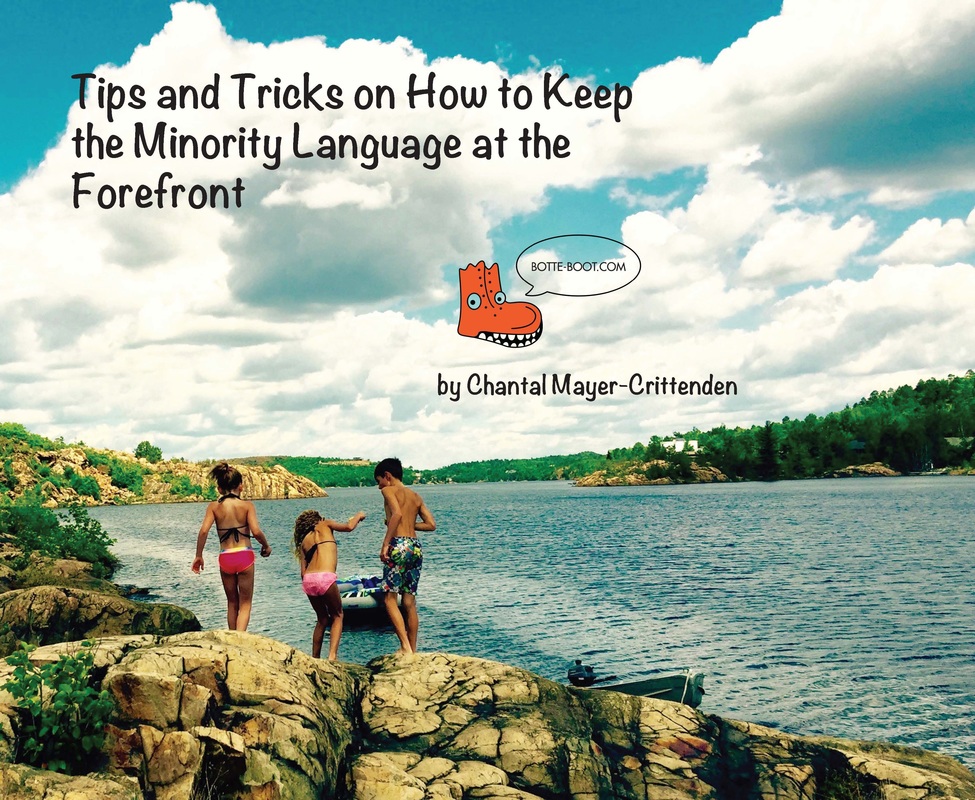|
It’s mid-summer and I have been enjoying my down time with our three kids. One week on, a couple of weeks off, another week on… It’s been good. As I sit here, a bystander listening to my kids play by the water, it baffles my mind to hear how they use languages. To them, languages are a means to get their point across or to get their needs met. They speak English to our dog, English to their cottage friends, to my husband’s side of the family, to their campmates at their bilingual summer camp as well as with most friends from our neighbourhood. They usually speak French to me and to their dad as well as to my parents, except when they are surrounded by their English-speaking friends. In those instances, they will sometimes turn to me and speak English so I try to make a point of asking them to switch to French but I am sometimes reluctant to do so, for fear of sounding punitive. “Parlez français” [speak French!], is what I hear myself saying over and over again.
Here’s a sample of what I am hearing while I write this post. I am outside in our gazebo and they are swimming in the lake: Matt: French: Je vais retourner avec mon bateau. [I’m going back with my boat] Sarah: French: Je vais sauter. [I will jump] Matt: English: Let’s go, I’m going tubing. Julianne: English: Sarah let's go. Sarah: English: Matt I said I was jumping. French: Je sais, je veux sauter [I know, I want to jump] Matt: English: Sarah hurry up. French: Julianne assieds-toi en avant [Julianne sit in the front] They switch from one language to another for no reason other than because they can! What gets me going is when the words within their sentences are so mixed up between languages that I actually have to stop and think about what they are saying. I will often make light of that and give them an inquisitive look. I explain to them that it’s okay to mix up the languages, but that whenever possible, they need to take a few seconds to think about the words they are looking for and use one language in one sentence. Here’s an example of such code-mixing I just heard in the last 5 minutes: Julianne: Je wish que je pourrais diver off le dock” [I wish I could dive (with French verb ending) off the dock] What I normally do is repeat what they say by giving them the right words. In this case, I could have said: “Ah oui? Tu souhaites de plonger en bas du quai ? Vas-y!” [Oh ya? You wish you could dive off the dock? Go for it!”]. Sometimes they repeat what I have just said and other times they carry on with what they were doing. The interesting thing is this: very seldom do they use French words when they speak English. It’s usually the other way around. They use English words when I know for a fact that they have the French words in their vocabulary. Other times, I catch my three French-native children speak English to each other, like the example above, which is a great thing don’t get me wrong but I worry at times that they don’t get enough French exposure. In this age of iPods, iPads, AppleTV, Netflix and iTunes, they are inundated with English media to the point that French TV and French music are now the less preferred choices. I try to purchase French TV series and French music when I can, but it’s as though their default for media is now English. We try to set some time aside a few days a week to read in French. Luckily, French is still their default language when it comes to reading. Mainly because in Ontario, they only formally learn to read in English in grade 4, at the age of 10. Why do I care so much? I guess it’s because French is the minority language here. Kids and teenagers usually end up speaking English to each other, even if they all have French as their first language. Most Francophone adults, who are actually bilingual (English as the second language), end up working in English the minute they get their first job. Work in French is usually limited to positions within the French school boards or specific government-funded programs that promote the French language. So English ends up being heard and used all over the place. Since French is my heritage language, I really want to pass down that heritage, culture and language to my kids. My husband, who learned French as the kids spoke their first words, is also very intrigued by our kids’ use of their two languages. He will often ask them to speak French to each other or better yet, point out to them when they are mixing up their languages! He understands the value of encouraging the use of the minority language and for that I am grateful. It’s a real battle. I’m extremely conscious of the importance of promoting the French (or minority) language to our young ones, but I struggle with the means to meet that end! Here are a few tips and tricks that have worked for us:
For more tips, check out these handouts that I have created:
|
|


 RSS Feed
RSS Feed